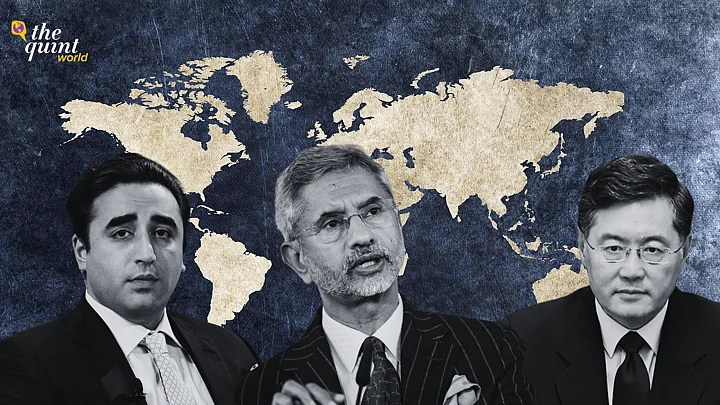The stage is set for the Shanghai Corporation Organisation's (SCO) foreign ministers meet in Goa on 4 and 5 May, where top diplomats will discuss an array of geo-politically significant issues, including economic cooperation and regional security.
Chinese Foreign Minister Qin Gang, Russia's Sergey Lavrov, and Pakistan Foreign Minister Bilawal Bhutto-Zardari will be among the attendees. The meeting is set to be chaired by Union External Affairs Minister S Jaishankar.
The meeting is the third in a series leading up to the SCO Summit on 4-5 July in New Delhi. Previously, the national security advisors meeting took place on 29 March, followed by the defence ministers meeting on 27 and 28 April.
Here's a full list of attendees set to participate in the meetings:
Dr S Jaishankar, minister of External Affairs of the Republic of India
Mukhtar Tileuberdi, deputy prime minister & foreign minister of the Republic of Kazakhstan
Qin Gang, foreign minister of the People's Republic of China
Kulubaev Moldokanovich Zheenbek, foreign minister of the Kyrgyz Republic
Bilawal Bhutto Zardari, foreign minister of Islamic Republic of Pakistan
Sergey Viktorovich Lavrov, foreign minister of Russian Federation
Sirojiddin Muhriddin, minister of Foreign Affairs of the Republic of Tajikistan
Vladimir Imamovich Norov, minister of Foreign Affairs of the Republic of Uzbekistan
Are Bilateral Talks on the Cards? What Can We Expect?
The Chinese foreign ministry announced that Qin will travel to Goa to "exchange views with other SCO member states’ foreign ministers on the international and regional situation and SCO cooperation in various fields, among other topics, to make full preparation for this year’s SCO summit."
Notably, Pakistan announced Bilawal Bhutto would lead the country's delegation to the meet in Goa, making it the first by any Pakistani leader since former Prime Minister Nawaz Sharif in 2014.
"Our participation in the meeting reflects Pakistan's commitment to the SCO Charter and processes and the importance that Pakistan accords to the region in its foreign policy priorities," Foreign Office spokesperson Mumtaz Zahrah Baloch said during a press briefing.
Previously, AK Mohapatra, professor of international relations at Jawaharlal Nehru University, told The Quint that India, as the host country, extended an invitation to Pakistan as the latter is a member of the SCO, and New Delhi would not like to be seen as in an unfriendly light. Also, unless there are bilateral talks between India and Pakistan on the sidelines of the SCO, no progress in the relations can be expected.
"I am not very optimistic about a breakthrough. But maybe the talks will create some positive conditions for further discussions and dialogue," Mohapatra said. "The maximum one can expect from these talks is that it will create scope for talks between the respective prime ministers of India and Pakistan in the future."AK Mohapatra, JNU professor
Meanwhile, a Russian official previously said, "Russian Foreign Minister Sergey Lavrov will take part in the meeting of the Council of Foreign Ministers of the Shanghai Cooperation Organisation (SCO) member states in India."
"There will also be an exchange of views on topical issues of the international and regional agenda," the official said.
Several reports have said that Jaishankar will hold bilateral talks with his Chinese and Russian counterparts, while there is still no confirmation on a possible bilateral with Pakistan's Foreign Minister Bilawal Bhutto.
Moreover, no details have been released on the focus areas of the bilateral meeting between Jaishankar and Qin Gang. Last year, former Chinese Foreign Minister Wang Yi visited India, followed by a visit by Gang for the G20 foreign ministers meeting this year.
Meanwhile, the agenda for India-Russia bilateral talks remain trade, geopolitical turmoil and the conflict in Ukraine.
For the India-Russia bilateral between the foreign ministers of the two sides, the focus remains on trade and geopolitical turmoil. Moreover, the Russian foreign minister's meeting is the third high-level visit from Russia in the last three weeks, after the Russian deputy PM and Russian defence minister visited India.
What Exactly Is the SCO?
The Shanghai Cooperation Organisation (SCO) is a regional bloc consisting of Russia, China, India, Pakistan, and four Observer States (Afghanistan, Belarus, Iran, and Mongolia) as well as six Dialogue Partners – Armenia, Azerbaijan, Cambodia, Nepal, Sri Lanka, and Turkey.
Besides India, Kazakhstan, China, Kyrgyzstan, Russia, Pakistan, Tajikistan and Uzbekistan hold SCO members, and the meetings in India are the first time India has taken over the group's presidency ever since it became a member in 2017.
The SCO aims to promote economic, political, and military cooperation among its members and was established almost two decades ago.
With a population representing around 42 percent of the world and 25% of global GDP, the SCO is a significant regional powerhouse.
PM Modi attended the SCO Summit in Uzbekistan. The 22nd Meeting of the Council of Heads of State of the SCO in September 2022 was the first in-person summit since the June 2019 meeting of the SCO leaders in Bishkek, Kyrgyzstan.
(With inputs from Sakshat Chandok.)
(At The Quint, we question everything. Play an active role in shaping our journalism by becoming a member today.)
